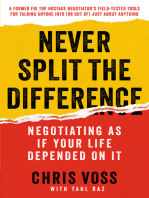0 ratings0% found this document useful (0 votes)
34 viewsBasfar v. Wong (2022)
Basfar v. Wong (2022)
Uploaded by
Abigail CaliboThe Supreme Court allowed an appeal by a majority of 3-2, finding that if the facts alleged are proved, a diplomat does not have immunity from a domestic worker's civil claim of forced labor and human trafficking. The majority held that exploiting a worker's labor for profit through conditions of modern slavery constitutes a commercial activity, distinguishing it from ordinary employment. The dissent argued that employment is not a commercial activity regardless of conditions, and expanding the commercial activity exception risks undermining diplomatic immunity.
Copyright:
© All Rights Reserved
Available Formats
Download as PDF, TXT or read online from Scribd
Basfar v. Wong (2022)
Basfar v. Wong (2022)
Uploaded by
Abigail Calibo0 ratings0% found this document useful (0 votes)
34 views4 pagesThe Supreme Court allowed an appeal by a majority of 3-2, finding that if the facts alleged are proved, a diplomat does not have immunity from a domestic worker's civil claim of forced labor and human trafficking. The majority held that exploiting a worker's labor for profit through conditions of modern slavery constitutes a commercial activity, distinguishing it from ordinary employment. The dissent argued that employment is not a commercial activity regardless of conditions, and expanding the commercial activity exception risks undermining diplomatic immunity.
Copyright
© © All Rights Reserved
Available Formats
PDF, TXT or read online from Scribd
Share this document
Did you find this document useful?
Is this content inappropriate?
The Supreme Court allowed an appeal by a majority of 3-2, finding that if the facts alleged are proved, a diplomat does not have immunity from a domestic worker's civil claim of forced labor and human trafficking. The majority held that exploiting a worker's labor for profit through conditions of modern slavery constitutes a commercial activity, distinguishing it from ordinary employment. The dissent argued that employment is not a commercial activity regardless of conditions, and expanding the commercial activity exception risks undermining diplomatic immunity.
Copyright:
© All Rights Reserved
Available Formats
Download as PDF, TXT or read online from Scribd
Download as pdf or txt
0 ratings0% found this document useful (0 votes)
34 views4 pagesBasfar v. Wong (2022)
Basfar v. Wong (2022)
Uploaded by
Abigail CaliboThe Supreme Court allowed an appeal by a majority of 3-2, finding that if the facts alleged are proved, a diplomat does not have immunity from a domestic worker's civil claim of forced labor and human trafficking. The majority held that exploiting a worker's labor for profit through conditions of modern slavery constitutes a commercial activity, distinguishing it from ordinary employment. The dissent argued that employment is not a commercial activity regardless of conditions, and expanding the commercial activity exception risks undermining diplomatic immunity.
Copyright:
© All Rights Reserved
Available Formats
Download as PDF, TXT or read online from Scribd
Download as pdf or txt
You are on page 1of 4
Basfar (Respondent) v Wong (Appellant) [2022]
UKSC 20 On appeal from: UKEAT/223/19/BA
Date: 6 July 2022
Justices
Lord Briggs, Lord Hamblen, Lord Leggatt, Lord Stephens, Lady Rose
Background to the Appeal
Ms Josephine Wong (a national of the Philippines) is a migrant domestic worker who
worked in the household of Mr Khalid Basfar, a diplomat representing the Kingdom of
Saudi Arabia in the United Kingdom. Ms Wong claims to be a victim of human trafficking
who was forced to work for Mr Basfar and his family in circumstances of modern slavery
after they brought her with them to the UK in August 2016. Ms Wong alleges that she was
confined, at all times, to Mr Basfar’s house except to take out the rubbish; that she was held
virtually incommunicado; that she was made to work from 7am to around 11.30pm each
day, with no days off or rest breaks; and that she was subjected to other degrading and
offensive treatment. After arriving in the UK, she was allegedly paid nothing for seven
months, then paid a fraction of her contractual entitlement in July 2017, and not paid again
until she escaped in May 2018.
Ms Wong has brought a claim against Mr Basfar in an employment tribunal for wages and
breaches of employment rights. Mr Basfar applied to have her claim struck out on the
ground that he has diplomatic immunity from suit. Under article 31 of the Vienna
Convention on Diplomatic Relations 1961 (the “Diplomatic Convention”), incorporated into
UK domestic law by the Diplomatic Privileges Act 1964, diplomatic agents enjoy complete
immunity from the criminal jurisdiction of the receiving state and are also generally immune
from its civil jurisdiction. There is, however, an exception for civil claims relating to “any
professional or commercial activity exercised by the diplomatic agent in the receiving State
outside his official functions.” None of the facts alleged by Ms Wong have been admitted by
Mr Basfar, but for the purpose of deciding whether the claim should be struck out her
allegations are assumed to be true. The issue is whether the conduct alleged constitutes a
“commercial activity exercised” by Mr Basfar within the exception from immunity. (The
conduct alleged is agreed to be “outside his official functions.”)
The employment tribunal declined to strike out Ms Wong’s claim. The Employment Appeal
Tribunal allowed Mr Basfar’s appeal but issued a certificate that the case was suitable for an
appeal directly to the Supreme Court, “leapfrogging” the Court of Appeal. The Supreme
Court then granted permission for this appeal.
Judgment
By a majority of three to two, the Supreme Court allows the appeal and decides that, if the
facts alleged are proved, Mr Basfar does not have diplomatic immunity in relation to the
claim. Lord Briggs and Lord Leggatt (with whom Lord Stephens agrees) give the joint
majority judgment. Lord Hamblen and Lady Rose give a dissenting judgment.
Reasons for the Judgment
Diplomatic immunity is a fundamental principle of national and international law. Its
purpose is to ensure the efficient performance of the functions of diplomatic missions as
representing States [11-12]. Article 31 of the Diplomatic Convention provides for only
limited exceptions from immunity, one of which is the “commercial activity” exception.
Also relevant is article 42, which states that a diplomatic agent “shall not in the receiving
state practise for personal profit any professional or commercial activity.” The text of the
convention must be interpreted in accordance with the principles contained in the Vienna
Convention on the Law of Treaties 1969, the general rule being that a treaty “shall be
interpreted in good faith in accordance with the ordinary meaning given to the terms of the
treaty in their context and in the light of its object and purpose” [16-17].
The majority agrees with Mr Basfar’s contention that the ordinary employment of a
domestic worker by a diplomat does not constitute a “commercial activity” within the
meaning of the exception [27]. As a matter of language, hiring a domestic worker is capable
of being described as exercising a “commercial activity”. But the scope of the exception
cannot be determined just by interrogating the ordinary meaning of the words used: it is also
necessary to consider the purpose of the provision [28-33]. It would be contrary to the
purpose of conferring immunity on diplomatic agents to interpret the words “any …
commercial activity” as including activities incidental to the ordinary conduct of daily life
of diplomats and their families in the receiving state, such as purchasing goods and services
for personal use [33-38].
However, Lord Briggs and Lord Leggatt reject Mr Basfar’s contention that the same is true
of the trafficking and exploitation of a domestic worker by a diplomat. Exploiting a
domestic worker by compelling her to work in conditions of modern slavery is not
comparable to an ordinary employment relationship that is incidental to the daily life of a
diplomat. There is a material and qualitative difference between these two activities:
employment is a voluntary relationship, entered into freely and governed by the terms of a
contract, whereas the essence of modern slavery is that work is extracted by coercing and
controlling a victim [42-43, 57]. This usually involves exploiting circumstances of the
victim which make them especially vulnerable to abuse. In the case of migrant domestic
workers, such circumstances often include physical and social isolation and invisibility to
the outside world; the dependency of the victim may be increased by psychological abuse
and withholding pay [44]-[48].
The extent of control over Ms Wong’s person and dominion over her labour exercised by Mr
Basfar on the assumed facts of this case was so extensive and despotic as to place her in a
position of domestic servitude [51]. Further, on the assumed facts Mr Basfar gained a
substantial financial benefit by deliberately and systematically exploiting Ms Wong’s labour
for almost two years, initially for a fraction of her contractual entitlement to wages and
latterly for no pay at all. This conduct is accurately described as a commercial activity
practised for personal profit [52-57].
In the view of the majority, the appropriate criteria for distinguishing between (i) ordinary
domestic employment arrangements that are incidental to the daily life of a diplomat in the
receiving state and are covered by immunity, and (ii) exploitation of a domestic worker for
profit which falls within the exception for any “commercial activity” exercised by a
diplomatic agent, are the concepts of servitude, forced labour and human trafficking
recognised in international law and now often grouped together under description “modern
slavery” [72-82]. On the assumed facts, this case falls within all these categories and is a
paradigm example of domestic servitude [96-100].
Among the arguments rejected by the majority is an argument that, if Ms Wong is allowed to
bring a civil claim in an employment tribunal for wages wrongly withheld, British diplomats
abroad might be exposed to retaliatory measures. First, it is difficult to see how such a risk,
even if genuine, can affect the meaning of the phrase “commercial activity”. Second, there is
no evidence to support the existence of such a risk [105-106].
The majority concludes that, if the facts alleged by Ms Wong are proved, Mr Basfar does
not have immunity from the civil jurisdiction of the UK courts. However, unless admissions
are made, a hearing is required to determine the truth of the allegations [107].
Lord Hamblen and Lady Rose dissent. Although they agree with the majority on the
principles of interpretation and that the normal employment of a domestic worker does not
amount to “commercial activity” within the exception, they disagree with the majority’s
conclusion that the conditions under which a person is employed or how they came to be
employed can convert employment which is not of itself a “commercial activity” into such
an activity falling within the exception [109-113]. The parties agreeing the Diplomatic
Convention were aware that domestic servants were engaged in diplomatic households. But
they recognised the importance of preserving diplomatic immunity despite the abuses of that
immunity that could be expected to take place [119-123]. Modern international instruments
designed to eliminate the abhorrent practices of trafficking, modern slavery, forced labour
and domestic servitude contain nothing suggesting that the meaning of the term
“commercial activity” has been expanded now to include trafficked employment [124-154].
The majority’s expansion of the commercial activity exception risks seriously undermining
the scope of diplomatic immunity by creating an uncertain boundary between what is and is
not covered, as well as exposing the UK’s diplomats overseas to formal or informal
retaliatory measures [155-169].
You might also like
- The Subtle Art of Not Giving a F*ck: A Counterintuitive Approach to Living a Good LifeFrom EverandThe Subtle Art of Not Giving a F*ck: A Counterintuitive Approach to Living a Good LifeRating: 4 out of 5 stars4/5 (6016)
- The Gifts of Imperfection: Let Go of Who You Think You're Supposed to Be and Embrace Who You AreFrom EverandThe Gifts of Imperfection: Let Go of Who You Think You're Supposed to Be and Embrace Who You AreRating: 4 out of 5 stars4/5 (1112)
- Never Split the Difference: Negotiating As If Your Life Depended On ItFrom EverandNever Split the Difference: Negotiating As If Your Life Depended On ItRating: 4.5 out of 5 stars4.5/5 (908)
- Grit: The Power of Passion and PerseveranceFrom EverandGrit: The Power of Passion and PerseveranceRating: 4 out of 5 stars4/5 (619)
- Hidden Figures: The American Dream and the Untold Story of the Black Women Mathematicians Who Helped Win the Space RaceFrom EverandHidden Figures: The American Dream and the Untold Story of the Black Women Mathematicians Who Helped Win the Space RaceRating: 4 out of 5 stars4/5 (937)
- Shoe Dog: A Memoir by the Creator of NikeFrom EverandShoe Dog: A Memoir by the Creator of NikeRating: 4.5 out of 5 stars4.5/5 (546)
- The Hard Thing About Hard Things: Building a Business When There Are No Easy AnswersFrom EverandThe Hard Thing About Hard Things: Building a Business When There Are No Easy AnswersRating: 4.5 out of 5 stars4.5/5 (358)
- Her Body and Other Parties: StoriesFrom EverandHer Body and Other Parties: StoriesRating: 4 out of 5 stars4/5 (831)
- Elon Musk: Tesla, SpaceX, and the Quest for a Fantastic FutureFrom EverandElon Musk: Tesla, SpaceX, and the Quest for a Fantastic FutureRating: 4.5 out of 5 stars4.5/5 (479)
- The Emperor of All Maladies: A Biography of CancerFrom EverandThe Emperor of All Maladies: A Biography of CancerRating: 4.5 out of 5 stars4.5/5 (275)
- The Little Book of Hygge: Danish Secrets to Happy LivingFrom EverandThe Little Book of Hygge: Danish Secrets to Happy LivingRating: 3.5 out of 5 stars3.5/5 (434)
- The World Is Flat 3.0: A Brief History of the Twenty-first CenturyFrom EverandThe World Is Flat 3.0: A Brief History of the Twenty-first CenturyRating: 3.5 out of 5 stars3.5/5 (2281)
- The Yellow House: A Memoir (2019 National Book Award Winner)From EverandThe Yellow House: A Memoir (2019 National Book Award Winner)Rating: 4 out of 5 stars4/5 (99)
- The Sympathizer: A Novel (Pulitzer Prize for Fiction)From EverandThe Sympathizer: A Novel (Pulitzer Prize for Fiction)Rating: 4.5 out of 5 stars4.5/5 (125)
- Devil in the Grove: Thurgood Marshall, the Groveland Boys, and the Dawn of a New AmericaFrom EverandDevil in the Grove: Thurgood Marshall, the Groveland Boys, and the Dawn of a New AmericaRating: 4.5 out of 5 stars4.5/5 (273)
- A Heartbreaking Work Of Staggering Genius: A Memoir Based on a True StoryFrom EverandA Heartbreaking Work Of Staggering Genius: A Memoir Based on a True StoryRating: 3.5 out of 5 stars3.5/5 (232)
- Team of Rivals: The Political Genius of Abraham LincolnFrom EverandTeam of Rivals: The Political Genius of Abraham LincolnRating: 4.5 out of 5 stars4.5/5 (235)
- On Fire: The (Burning) Case for a Green New DealFrom EverandOn Fire: The (Burning) Case for a Green New DealRating: 4 out of 5 stars4/5 (75)
- The Unwinding: An Inner History of the New AmericaFrom EverandThe Unwinding: An Inner History of the New AmericaRating: 4 out of 5 stars4/5 (45)
- 2024 Pretest cssnc2Document5 pages2024 Pretest cssnc2Abigail CaliboNo ratings yet
- Set A ReviewerDocument4 pagesSet A ReviewerAbigail CaliboNo ratings yet
- Full Text Cases Consti 2Document190 pagesFull Text Cases Consti 2Abigail CaliboNo ratings yet
- Case Digest Consti 2Document45 pagesCase Digest Consti 2Abigail CaliboNo ratings yet
- ABODEANDRELIGIONDocument123 pagesABODEANDRELIGIONAbigail CaliboNo ratings yet
- F1. Olfu Val I Refco 2yo 1 I HM1 Invitation Code 1Document1 pageF1. Olfu Val I Refco 2yo 1 I HM1 Invitation Code 1Abigail CaliboNo ratings yet
- JURISPRUDENCEDocument21 pagesJURISPRUDENCEAbigail Calibo0% (2)















































